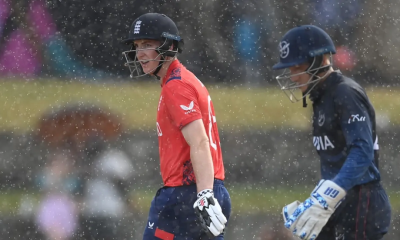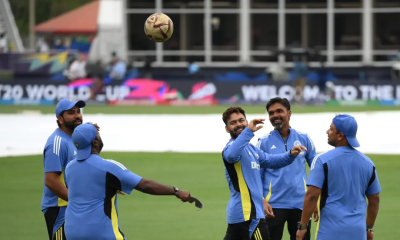Latest News
Jaiswal hits unbeaten 179 but England manage to strike regularly
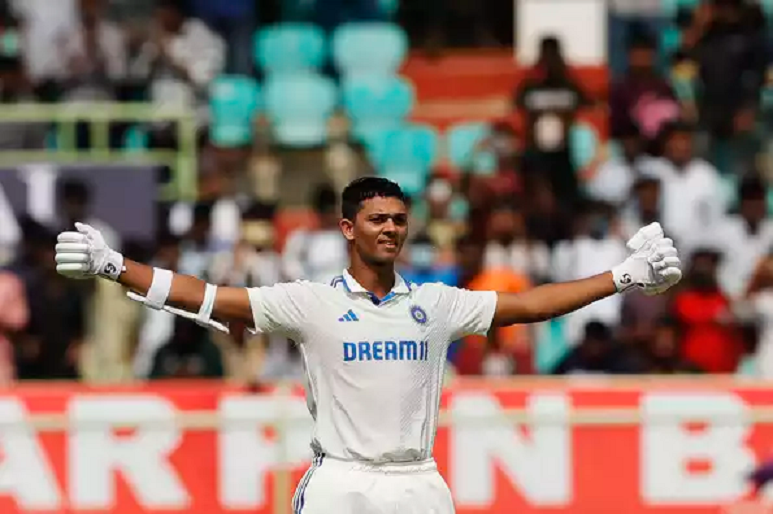
Yashasvi Jaiswal’s second Test ton offset, to some extent, the mistakes that India’s other batters committed after opting to bat on day one of the Vizag Test. His unbeaten 179 powered India to 336/6 by the end of the day with the next highest score of the day being a mere 34.
Jaiswal, after a fifty in the first Test, applied himself more in the second and worked his way to a stroke-filled hundred, getting to the landmark with an emphatic six over long on. The left-handed opener was the glue around which India’s batting revolved on a pitch that held no demons. He had partners stitching together stands but throwing it away eventually.
At the start of play, so intent was skipper Rohit Sharma in the defending that he missed out on a few boundary opportunities when the spinners erred. His 41-ball innings saw no boundaries being scored. He eventually fell glancing debutant Shoaib Bashir straight into the hands of legslip.
Jaiswal, meanwhile, continued to milk the spinners, cashing in on the boundary opportunities when they erred in lengths. He was briefly helped by a positive partner in Shubman Gill, who toyed with the spinners lengths by using his feet as well as sweeping occasionally.
But a well-set Gill fell to a well-laid trap by England, as James Anderson came in for a second spell before Lunch. Gill tried to mess with Anderson’s lengths by jumping out early but never looked in comfort, edging past the slip cordon dangerously. He eventually fell chasing a wide delivery and nicking to the keeper on 34, to be dismissed by the bowler for the fifth time in seven innings.
Jaiswal brought up his fifty in the company of Shreyas Iyer and the duo were held tight soon after the Lunch break with some disciplined bowling. The shackles were broken when Jaiswal went ahead after a sharp chance was put down at slip by Root and proceeded to hit three boundaries in a row to race into the nineties. Soon after he got his first Test hundred on home soil, India suffered another setback when a restless Iyer got an underedge that was pouched safely by Ben Foakes, giving Tom Hartley his first wicket of the game.
England had managed to keep India in check despite the batters getting off to starts with partnerships worth 40, 49, 90, 70 and 52 being nipped in the bud with regular strikes. This became the first instance of each of No.3, No. 4, No. 5 and No. 6 all getting dismissed between 25 and 35 in the same innings in Test cricket.
Patidar was a trifle unfortunate to be out with the ball trickling onto the stumps after some extra bounce had him defending awkwardly. Axar Patel, given a promotion to No. 6, and KS Bharat however were guilty of throwing away starts, each cutting the spinner to backward point towards the end of the day’s play leaving England with a big boost, despite Jaiswal’s marathon innings.
Brief Scores:
India 336/6 (Yashasvi Jaiswal 179*, Shubman Gill 34, Shreyas Ayer 27, Rajat Patidar 32, Axar Patel 27; Shoaib Basheer 2-100, Rehan Ahmed 2-69) vs England
Foreign News
Hundreds of flights cancelled in China as strong winds hit capital
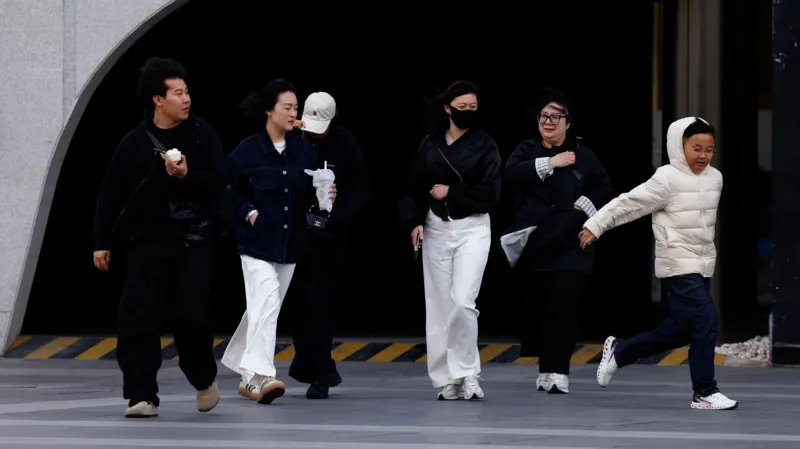
Hundreds of flights have been cancelled and trains suspended as gales hit Beijing and northern China today [Saturday].
By 11:30 local time (03:30 GMT) today, 838 flights had been cancelled at the capital’s two major airports, according to the news agency Reuters.
Wind gusts of up to 93mph (150kph) – the strongest in the Chinese capital for more than half a century – are set to continue through the weekend, forcing the closure of attractions and historic sites.
Millions were urged to stay indoors on Friday, with some state media outlets warning that people weighing less than 50kg may be “easily blown away”.
Train services, including the airport’s express subway line and some high-speed rail lines, have been suspended.
Parks were also shut, with some old trees reinforced or trimmed in preparation – but almost 300 trees have already fallen over in the capital.
A number of vehicles were damaged, but no injuries were reported. In Beijing, most residents followed authorities’ advice to stay indoors after the city warned 22 million residents to avoid non-essential travel.
“Everyone in Beijing was really nervous about it. Today there are hardly any people out on the streets. However, it wasn’t as severe as I had imagined,” a local resident told Reuters.
Meanwhile, a businessman from the Zhejiang province, near Shanghai, had his flight home cancelled.
“Because of the severe winds, all flights scheduled for last night and today were cancelled. So I will probably rebook my flight in a couple of days. I’m now basically stranded in Beijing,” he said.
The strong winds are from a cold vortex system over Mongolia and are expected to last through the weekend.
Winds bringing sand and dust from Mongolia are routine in spring, but climate change can make storms stronger and more severe.
Beijing issued its first orange alert for strong winds in a decade, with the strongest winds expected to arrive on Saturday.
China measures wind speed on a scale that goes from one to 17. A level 11 wind, according to the China Meteorological Administration, can cause “serious damage”, while a level 12 wind brings “extreme destruction”.
The winds this weekend are expected to range from level 11 to 13, with conditions expected to ease by Sunday.
[BBC]
Latest News
Iran says it wants ‘fair agreement’ as nuclear talks with US begin in Oman
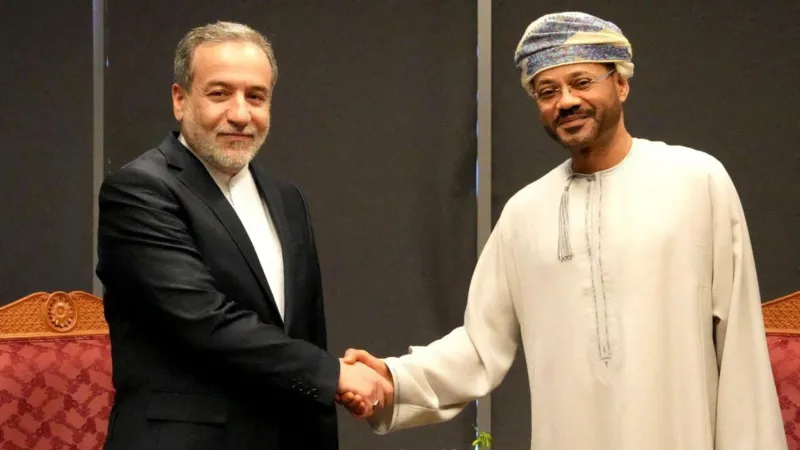
Iran and the United States have begun talks in Oman over Teheran’s nuclear programme – the highest level meeting between the two nations since 2018.
Iran’s Foreign Minister Abbas Araghchi told Iranian state television his country wanted a “fair agreement”, with his spokesperson saying he did not expect talks to last long.
President Donald Trump pulled the US out of a previous nuclear agreement between Iran and world powers in 2018, and has long said he would make a “better” deal.
It is unclear if the two delegations will sit in the same room, but the talks are seen as an important first step to establishing whether a deal can be done, as well as a framework for negotiations.
Araghchi has repeatedly emphasised that indirect talks were best at this stage.
Trump’s envoy Steve Witkoff, who is leading the US delegation, has only spoken of meeting face-to-face.
But the most important issue is what kind of deal each side would accept.
Trump sent a letter to Iran’s supreme leader via the United Arab Emirates last month, saying he wanted a deal to prevent Iran from acquiring nuclear weapons and to avert possible military strikes by the US and Israel.
Iran hopes a deal to limit, but not dismantle, its nuclear programme in exchange for sanctions relief.
“Our intention is to reach a fair and honourable agreement from an equal position, and if the other side also comes from the same position, then hopefully there will be a chance for an initial understanding that will lead to a path of negotiations,” Araghchi said.
He added that the team that came with him was made up of experts “knowledgeable in this particular field and who have a history of negotiating on this issue”.
An unnamed source in Oman told the news agency Reuters that the talks would also seek to de-escalate regional tensions and secure prisoner exchanges.
Trump disclosed the upcoming talks during a visit by Benjamin Netanyahu to the White House on Monday. The Israeli prime minister said on Tuesday that both leaders had agreed “Iran will not have nuclear weapons”.
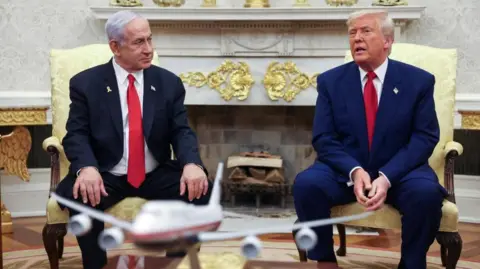
Trump has warned that the US would use military force if a deal was not reached, and Iran has repeatedly said it will not negotiate under pressure.[BBC]
The US president told reporters in the Oval Office on Monday that this weekend’s meeting in Oman would be “very big”, while also warning that it would “be a very bad day for Iran” if the talks were unsuccessful.
Iran insists its nuclear activities are entirely peaceful and that it will never seek to develop or acquire nuclear weapons.
However, since Trump pulled out of the 2015 agreement – which expires later this year – Iran has increasingly breached restrictions imposed by the existing nuclear deal in retaliation for crippling US sanctions reinstated seven years ago, and has stockpiled enough highly-enriched uranium to make several bombs.
Witkoff has also been involved in peace talks on the Russia-Ukraine war, meeting Russian President Vladimir Putin in St Petersburg on Friday.
[BBC]
Latest News
Navy intercepts craft with packages suspected to be narcotics

A special naval operation at sea led to the interception of a craft with packages suspected to be narcotics.
More details regarding the incident will be released as they become available.
(Navy Media)
-

 Business6 days ago
Business6 days agoColombo Coffee wins coveted management awards
-

 Features7 days ago
Features7 days agoStarlink in the Global South
-

 Features2 days ago
Features2 days agoRobbers and Wreckers
-

 Features4 days ago
Features4 days agoSri Lanka’s Foreign Policy amid Geopolitical Transformations: 1990-2024 – Part III
-

 Features7 days ago
Features7 days agoModi’s Sri Lanka Sojourn
-

 Midweek Review4 days ago
Midweek Review4 days agoInequality is killing the Middle Class
-

 Features6 days ago
Features6 days agoSri Lanka’s Foreign Policy amid Geopolitical Transformations: 1990-2024 – Part I
-

 Features5 days ago
Features5 days agoA brighter future …




